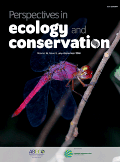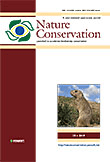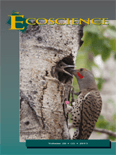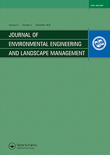
LANDSCAPE ECOLOGY
metrics 2024
Advancing the Science of Spatial Dynamics
Introduction
LANDSCAPE ECOLOGY, published by SPRINGER, is a premier journal dedicated to the field of landscape ecology, bringing together innovative research that intersects ecology, geography, and conservation. With a prestigious history since its inception in 1987, this journal showcases high-impact studies reflected in its impressive 2023 rankings in the first quartile of Ecology, Geography, Planning and Development, and Nature and Landscape Conservation categories. Operating from the Netherlands, LANDSCAPE ECOLOGY serves as a critical platform for scholars and practitioners aiming to advance their understanding of spatial analysis, environmental challenges, and landscape management. While the journal operates on a traditional access model, the quality and rigor of published research ensure it remains a vital resource for the academic community, inspiring a deeper exploration of our dynamic natural environments and the socio-ecological interactions within them.
Metrics 2024
 1.36
1.36 4.00
4.00 4.90
4.90 150
150Metrics History
Rank 2024
Scopus
IF (Web Of Science)
JCI (Web Of Science)
Quartile History
Similar Journals

Journal of Mountain Science
Elevating Research on Sustainable Mountain DevelopmentThe Journal of Mountain Science, published by SCIENCE PRESS, is a distinguished academic journal dedicated to advancing the understanding of mountain environments and their significance in various scientific domains. With an ISSN of 1672-6316 and an E-ISSN of 1993-0321, this journal has carved a niche in the field of Earth sciences, earning a commendable Q2 ranking in categories such as Earth-Surface Processes, Geography, Planning and Development, and Geology, as well as a Q3 ranking in Global and Planetary Change. Since its inception in 2007, the journal has been pivotal in fostering interdisciplinary research that addresses critical environmental issues, making it an essential resource for researchers, professionals, and students alike. While currently not offering open access, it provides valuable insights into areas including nature conservation and landscape management, with a focus on the unique challenges faced by mountainous regions. Located in Beijing, China, the Journal of Mountain Science continues to promote scholarly discourse that contributes to the sustainable development of mountain communities and ecosystems until 2024 and beyond.

Perspectives in Ecology and Conservation
Advancing ecological understanding for a sustainable future.Perspectives in Ecology and Conservation, published by Elsevier Science Ltd, is a leading academic journal dedicated to advancing the fields of ecology, conservation, and environmental management. With a Q1 ranking in multiple categories, including Ecology, Management, Monitoring, Policy and Law, and Nature and Landscape Conservation, this journal boasts an impressive standing among its peers, making it essential reading for researchers and professionals. Since its inception in 2017 and running through 2024, it aims to provide innovative perspectives and critical analyses that enhance our understanding and practices in conservation science. The journal is accessible through open access options, facilitating broader dissemination of knowledge. Its commitment to addressing contemporary ecological challenges reinforces its importance in the academic community, promoting sustainable practices and informed policy-making in the face of urgent environmental issues.

ACTA OECOLOGICA-INTERNATIONAL JOURNAL OF ECOLOGY
Illuminating Pathways to Sustainable SolutionsACTA OECOLOGICA-INTERNATIONAL JOURNAL OF ECOLOGY, published by Elsevier, stands as a prominent platform for disseminating innovative research in the diverse field of ecology. Operating since 1983 and continuing to make significant contributions into 2024, this journal features critical studies that advance our understanding of ecological systems, behaviors, and conservation efforts. With an impressive Q2 ranking in both the ecology and nature conservation categories, it exemplifies high-quality scholarship, reflected in its Scopus rankings—#74 in Environmental Science and #254 in Agricultural and Biological Sciences. Researchers, professionals, and students in the field are invited to explore the latest findings and methodologies that address pivotal ecological issues. As a journal committed to fostering academic collaboration, ACTA OECOLOGICA is essential for anyone dedicated to enhancing their comprehension of ecological dynamics and advancing sustainability practices globally.

Folia Oecologica
Advancing Ecological Knowledge for a Sustainable Future.Folia Oecologica is a distinguished open-access journal published by WALTER DE GRUYTER GMBH, focusing on critical research in the fields of agricultural and biological sciences, ecology, and forestry. Established as a vital platform for the dissemination of knowledge, this journal has been providing free access to its valuable content since 2017, catering to an international audience engaged in environmental and ecological studies. With its ISSN 1336-5266 and E-ISSN 1338-7014, Folia Oecologica has earned notable ranks in Scopus, placing it in the 62nd percentile for Agricultural and Biological Sciences and the 50th percentile for Environmental Science. The journal's commitment to high-quality research is reflected in its positions in the Q2 and Q3 quartiles across various categories in 2023. As it converges years from 2006 to 2024, Folia Oecologica continues to foster scholarly dialogue and collaboration among researchers, professionals, and students, making significant contributions to the understanding and preservation of our ecological systems.

Landscape and Ecological Engineering
Innovating the intersection of ecology and engineering.Landscape and Ecological Engineering, published by SPRINGER JAPAN KK, is a vital journal that serves as a platform for the dissemination of innovative research and methodologies in the fields of landscape ecology and environmental engineering. With an ISSN of 1860-1871 and E-ISSN 1860-188X, this journal showcases articles that address the dynamic interplay between ecological processes and engineering designs in both natural and urban environments. As a significant publication since its inception in 2006, it is recognized in the Q2 quartile for Ecology and Nature and Landscape Conservation, alongside its placement in the Q3 quartile for Management, Monitoring, Policy, and Law, ensuring its relevance across multiple dimensions of environmental studies. The journal's presence in prominent databases, reflected in its Scopus rankings, highlights its commitment to high-quality, impactful research that guides conservation strategies and landscape management practices. Engaging with Landscape and Ecological Engineering provides researchers, professionals, and students with critical insights and developments, promoting sustainable solutions for ecological challenges. This journal is an essential resource for anyone seeking to enhance their understanding of ecological engineering approaches and landscape conservation efforts.

Nature Conservation-Bulgaria
Fostering collaboration in the pursuit of environmental excellence.Nature Conservation-Bulgaria is a distinguished peer-reviewed journal published by PENSOFT PUBLISHERS, dedicated to advancing the field of conservation through a comprehensive exploration of ecological and environmental issues. Since its inception in 2012, this Open Access journal has cemented its position as an essential resource for researchers, professionals, and students interested in the complex dynamics of ecosystems and biodiversity conservation. With an impressive Q2 ranking in both the Ecology, Evolution, Behavior and Systematics and Nature and Landscape Conservation categories, the journal showcases significant contributions to ecological scholarship, reflecting its commitment to vibrant and impactful research. The journal's coverage extends from 2012 to 2024, and it is indexed in Scopus, where it ranks in the 63rd percentile for key areas within Agricultural and Biological Sciences. With its base in Bulgaria, the journal also aims to highlight regional conservation efforts while maintaining global relevance, making it an indispensable platform for disseminating vital knowledge and fostering collaboration across the scientific community.

ECOSCIENCE
Advancing ecological knowledge for a sustainable future.ECOSCIENCE, published by Taylor & Francis Inc, stands as a prominent journal in the fields of Ecology and Environmental Science, recognized for its commitment to advancing knowledge since its inception in 1994. With an ISSN of 1195-6860 and an E-ISSN of 2376-7626, the journal caters to a diverse audience of researchers, professionals, and students passionate about ecological and environmental issues. In 2023, it achieved Q2 and Q3 rankings in the Scopus category of Ecology and Evolution, Behavior and Systematics, reflecting its significance within the academic community. Moreover, ECOSCIENCE occupies notable positions in Scopus rankings, including Rank #324 in Agricultural and Biological Sciences and Rank #210 in Environmental Science, symbolizing its role as a catalyst for disseminating high-quality research. Although currently not open access, the journal's multifaceted scope encourages in-depth discussions on ecological diversity, conservation strategies, and sustainable practices, making it an invaluable resource for those engaged in ecological research and practice.

Journal of Environmental Engineering and Landscape Management
Fostering Global Collaboration in Environmental ResearchJournal of Environmental Engineering and Landscape Management, published by VILNIUS GEDIMINAS TECH UNIV, serves as a pivotal platform for disseminating innovative research in the fields of environmental engineering and landscape management. With an Open Access policy since 2018, this journal fosters global knowledge exchange and accessibility, enhancing collaboration among researchers, professionals, and students alike. The journal, indexed under ISSN 1648-6897 and E-ISSN 1822-4199, features a diverse range of topics covering environmental engineering, management policies, and conservation strategies, thus contributing to sustainable development practices. As of 2023, it holds a Q3 quartile ranking across multiple categories, including Environmental Engineering and Nature and Landscape Conservation, demonstrating its commitment to excellence amidst competitive academic fields. The journal spans from 2004 to 2024, steadily solidifying its influence and relevance in shaping environmental discourse and practices. Join a vibrant community of scholars dedicated to addressing pressing environmental challenges through this distinguished publication.

WETLANDS
Innovating Conservation Through Cutting-Edge ResearchWETLANDS is a prestigious academic journal dedicated to advancing the understanding of wetland ecosystems, published by SPRINGER and based in the Netherlands. Established in 1981, this journal has consistently offered high-quality research on ecological dynamics, environmental chemistry, and broader environmental science topics, as indicated by its notable rankings in the 2023 category quartiles: Q2 in Ecology and Environmental Science (miscellaneous) and Q3 in Environmental Chemistry. The journal impacts the scientific community significantly, as reflected in its Scopus rankings, which place it within the top percentiles of its field. This makes WETLANDS an essential resource for researchers, professionals, and students aiming to stay at the forefront of wetland research and conservation efforts. With continual contributions from experts worldwide, it not only disseminates critical findings but also fosters collaboration and innovation within this vital area of environmental science.

WEB ECOLOGY
Exploring the Interconnectedness of Digital and Natural WorldsWEB ECOLOGY is a premier academic journal published by COPERNICUS GESELLSCHAFT MBH, specializing in the field of Ecology, with a specific emphasis on the intricate interrelations between web-based ecosystems and environmental factors. Since its inception in 2000, this Open Access journal has provided an invaluable platform for researchers, professionals, and students to disseminate and access cutting-edge research findings. Currently based in Germany, WEB ECOLOGY has garnered a significant reputation, evidenced by its prestigious Q2 quartile ranking in both Ecology and Ecology, Evolution, Behavior and Systematics as of 2023. Furthermore, its impressive Scopus rankings, placing it within the top quartiles of its categories, highlight its relevance and influence in the field. With comprehensive coverage from 2000 to 2024, the journal aims to foster dialogue and innovation in ecological research, making significant contributions to our understanding of web ecology and inviting submissions that push the boundaries of current knowledge.